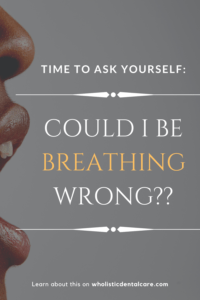
At some point during my childhood, I’ve been a mouth breather. Nowadays, there are a few times where I bounce back into the habit unconsciously even when my sinuses are all cleared and fine. I don’t know, it just happens! But thankfully, I catch myself doing it and revert back to good old regular nasal breathing.
Why Does It Occur?
If mouth breathing is bad, why does it occur in the first place? The answer may be from several factors or a combination of these, which include:
- Mouth breathing could be a bad habit formed during childhood. Perhaps a child was not being nursed properly. Or after a bad cold a person never returned to normal breathing. Some even suspect that children mirror parents who have this habit.
- There may be the presence of a small mouth which may affect tongue posture.
- Chronic sinus problems such as rhinitis and allergies
The Usual Symptoms
- Open mouth during sleep
- Sleep Apnea/ snoring
- Apparent saliva on pillow
- Sleep problems
- Nasal obstruction
- Fatigue and irritability during the day
- Orofacial changes such as half-open lip, lower tongue position, and lip, tongue & cheek hypo-tonicity
The Tea About Mouth Breathing
So, what’s the figurative “tea” with mouth breathing? According to dental research in 2016 by the University of Otago’s Sir John Walsh Research Institute, mouth breathing can cause your mouth’s pH level to become acidic. In some cases, the participants’ mouths were actually more acidic than the critical threshold where your tooth’s hard casing called “enamel” starts to demineralize or break down. You see, saliva acts as a buffer that prevents or slows down the drastic shift into an acidic environment in the mouth which is caused by pathogenic bacteria. When a person breathes through their mouth during sleep, saliva dries up fast and doesn’t reach the area of the teeth as much as it should. So in the span of an evening’s sleep, your mouth becomes an acidic playground for erosion of the tooth to occur. It should also be noted that pathogenic bacteria also help in destroying tooth structure by increasing the mouth’s acidity and thereby causing tooth caries.
Mouth Breathing and Its Effect on Life
A much unknown fact is that nasal breathing helps in promoting the production of nitric oxide (or NO). Most NO is known to derive locally from enzymes in the nose, and this plays an important role in the regulation of blood flow (reducing blood pressure), for the function of platelets, for cell immunity, and for neurotransmission. Nasal breathing allows this naturally made substance to reach the lower airways to the lungs where oxygen absorption is increased.
Mentally, the lack of sleep caused by physical effects may cause them to lose focus during the day. This can affect how they learn and perform in school. There is actually a growing trend seen wherein health care providers misdiagnosis mouth breathing effects with attention deficit disorder or (ADD) and hyperactivity. This may be due to the relative lack of awareness about the effects of upper airway obstruction or mouth breathing. In adults, it has been noted that mouth breathers have a lower quality of sleep due to disordered breathing resulting in fatigue and decreased productivity.
Emotionally, mouth breathing effects on the skeletal structure play a part in the confidence-building and self-esteem of kids and young adults alike. Malocclusion, gummy smiles, and skeletal class IIs and IIIs are deemed unattractive by a majority of societal standards.
The Role of the Dentist and Other Health Professionals
If you suspect yourself of mouth breathing, inform your local health care provider. Dentists are often the first ones to notice it. The provider must record information about breathing and go with a multidisciplinary approach in order to avoid the cascading effects that this may have on a young child.
Addressing the problem from the start, nasal congestion management could be the key to stopping the bad habit from forming. Since rhinitis is pegged as one of the leading causes of nasal obstruction, make sure to consult and ask for recommended long term management, which often includes the use of decongestants, corticosteroids, allergy shots, or basically avoiding triggers.
Resources:
https://www.otago.ac.nz/news/news/otago527804.html
https://oralsystemiclink.net/file/16/Breathing-Through-Mouth-at-Night-May-Increase-Tooth-Decay.pdf
https://www.oralhealthgroup.com/features/mouth-breathing-and-the-dentist/
https://www.oralhealthgroup.com/features/mouth-breathing-physical-mental-emotional-consequences/
Leave A Comment Cancel reply
You must be logged in to post a comment.